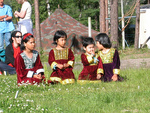Indigenous approaches to governance
![rehpenraigi[1]_260x165](https://img9.custompublish.com/getfile.php/1015522.1529.wexqspaprp/416x0/4637506_1015522.jpg)
Indigenous decision making processes: Peoples' perspectives: what can we learn from traditional governance?
 Component A consists of a small team of geographically dispersed Indigenous researchers who have investigated key elements of Indigenous governance. Joanne Barnaby – a Dene woman based in NWT, has chaired this work. The team drawed from the voices and experience of Indigenous peoples across the arctic, past and present, for insights into principles, values and protocols which support effective governance in the Arctic. Focusing on Indigenous decison making processes and the role of leadership, this paper articulates the necessary support which ensure governance is effective from the peoples perspective.
Component A consists of a small team of geographically dispersed Indigenous researchers who have investigated key elements of Indigenous governance. Joanne Barnaby – a Dene woman based in NWT, has chaired this work. The team drawed from the voices and experience of Indigenous peoples across the arctic, past and present, for insights into principles, values and protocols which support effective governance in the Arctic. Focusing on Indigenous decison making processes and the role of leadership, this paper articulates the necessary support which ensure governance is effective from the peoples perspective.
Indigenous Governance in the Arctic
 Component B is comprised of a paper researched by Gail Fondahl and Stephanie Irlbacher-Fox of the University of British Columbia. Fondahl/Irlbacher-Fox focus much of their work on Russia. The report is (i) evaluating the experience of the indigenous peoples of the circumpolar Arctic with the development and use of traditional governance systems and (ii) distilling principles from the experience that may be relevant to addressing issues of Arctic governance today.
Component B is comprised of a paper researched by Gail Fondahl and Stephanie Irlbacher-Fox of the University of British Columbia. Fondahl/Irlbacher-Fox focus much of their work on Russia. The report is (i) evaluating the experience of the indigenous peoples of the circumpolar Arctic with the development and use of traditional governance systems and (ii) distilling principles from the experience that may be relevant to addressing issues of Arctic governance today.
Arctic Governance: Traditional Knowledge of Arctic Indigenous Peoples from an International Policy Perspective
 By Terry Fenge and Bernard W. Funston
By Terry Fenge and Bernard W. Funston
This paper was prepared as a contribution to the Arctic Governance Project (www.arcticgovernance.org). The paper examines the role of tradtional knowledge in existing governance arrangements in the Arctic, including how traditional knowledge is addressed in selected Arctic-relevant international agreements. It discusses how these international agreements relate to regional governance arrangements and claims of sovereignty, co-management, and self-rule. Human rights and existing governance arrangements, negotiated between Arctic indigenous peoples and the states in which they reside, could usefully inform the evolution of international governance arrangements in the region.
At the intersection of indigenous and international treaties
 Tony Penikett shows how governance in the Arctic, particularly as it applies to Indigenous Peoples, is evolving rapidly, stimulated by international human rights arrangements and negotiated agreements between Arctic Indigenous Peoples and Arctic states. He notes that implementing new governance arrangements in the Arctic is proving problematic and sees the need for formal and informal mechanisms nationally and internationally to resolve disputes between Indigenous peoples and national governments and international bodies. Penikett stresses mediation and independent adjudication as means to resolve disputes. He discusses the case for an international Arctic treaty between Arctic Indigenous Peoples rather than the eight Arctic states, as a means of setting out the rights and interests of the region's Indigenous peoples. Read his paper.
Tony Penikett shows how governance in the Arctic, particularly as it applies to Indigenous Peoples, is evolving rapidly, stimulated by international human rights arrangements and negotiated agreements between Arctic Indigenous Peoples and Arctic states. He notes that implementing new governance arrangements in the Arctic is proving problematic and sees the need for formal and informal mechanisms nationally and internationally to resolve disputes between Indigenous peoples and national governments and international bodies. Penikett stresses mediation and independent adjudication as means to resolve disputes. He discusses the case for an international Arctic treaty between Arctic Indigenous Peoples rather than the eight Arctic states, as a means of setting out the rights and interests of the region's Indigenous peoples. Read his paper.
****************************************************************************************
